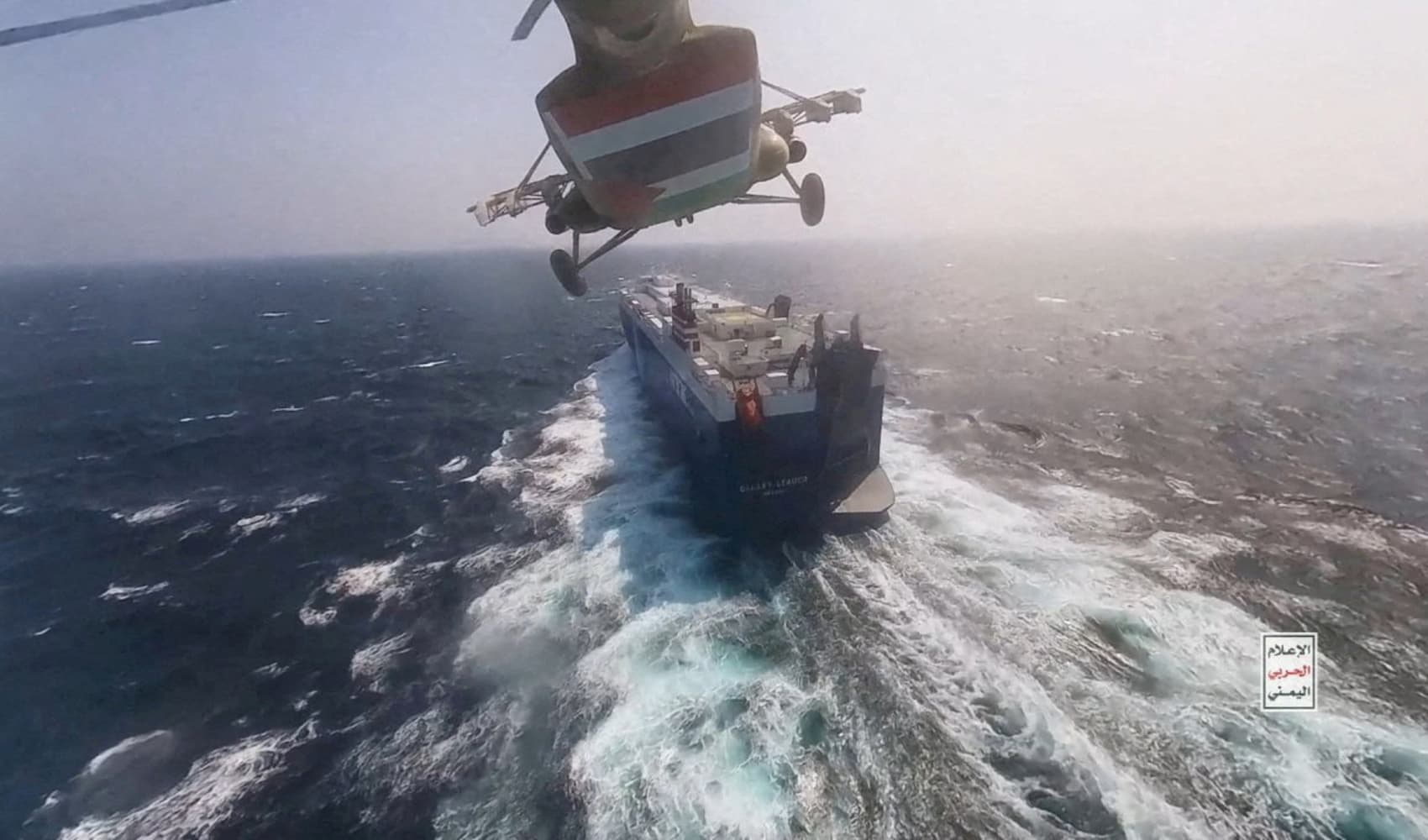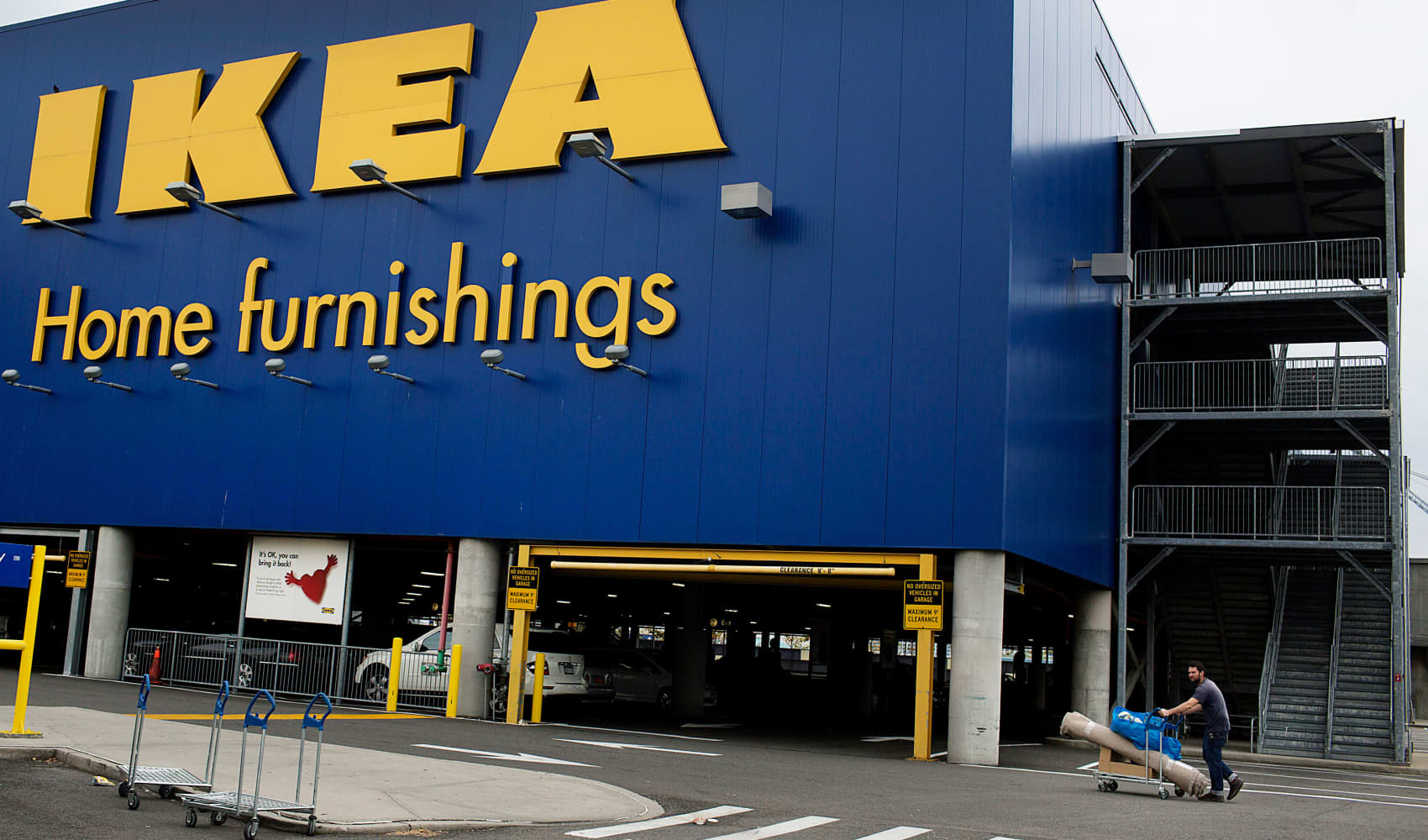
The U.S. military said Sunday that its forces opened fire on Houthi rebels after they attacked a cargo ship in the Red Sea, killing several of them in an escalation of the maritime conflict linked to the war in Gaza.
In a series of statements, the U.S. Central Command said the crew of the USS Gravely destroyer first shot down two anti-ship ballistic missiles fired at the Singapore-flagged Maersk Hangzhou late Saturday, after the vessel reported getting hit by a missile earlier that evening as it sailed through the Southern Red Sea.
Four small boats then attacked the same cargo ship with small arms fire early Sunday and rebels tried to board the vessel, the U.S. Navy said.
Next, the USS Gravely and helicopters from the USS Dwight D. Eisenhower aircraft carrier responded to the Maersk Hangzhou's distress call and issued verbal warnings to the attackers, who responded by firing on the helicopters.
“The U.S. Navy helicopters returned fire in self-defense,” sinking three of the four boats and killing the people on board while the fourth boat fled the area, the U.S. Central Command said. No harm to U.S. personnel or equipment, or casualties from the cargo ship, were reported.
The Houthis acknowledged that 10 of their fighters were killed in the confrontation and warned of consequences.
The events surrounding the Maersk Hangzhou represented the 23rd illegal attack by the Houthis on international shipping since Nov. 19, the Central Command said. It was the first time the U.S. Navy said its personnel had killed Houthi fighters since the Red Sea attacks started.
For over a month, Iran-backed Houthis have claimed attacks on ships in the Red Sea that they say are either linked to Israel or heading to Israeli ports. They say their attacks aim to end the Israeli air-and-ground offensive in the Gaza Strip that was triggered by the Palestinian militant group Hamas' Oct.7 attack in southern Israel.
However, the links to the ships targeted in the rebel assaults have grown more tenuous as the attacks continue.
The Denmark-based shipping giant Maersk, owner of Maersk Hangzhou, said Sunday it would suspend shipping through the Red Sea again after the two attacks on its freighter.
Feeling out of the loop? We'll catch you up on the Chicago news you need to know. Sign up for the weekly Chicago Catch-Up newsletter.
“In light of the (most recent) incident — and to give time to investigate the details of the incident and assess the security situation further — it has been decided that all transits through the area will be postponed for the next 48 hours,” Maersk was quoted as saying by the Danish public broadcaster DR.
Earlier, the top commander of U.S. naval forces in the Middle East said that the Houthi rebels showed no signs of ending their “reckless” attacks on commercial ships in the Red Sea. More nations have joined the international maritime mission to protect vessels in the vital waterway and trade traffic has begun to pick up.
Since Operation Prosperity Guardian was announced just over 10 days ago, 1,200 merchant ships have traveled through the Red Sea region, and none had been hit by drone or missile strikes, Vice Adm. Brad Cooper said in an Associated Press interview, although the U.S. military said that one ship reported being struck by a missile late Saturday.
Cooper said earlier that day that additional countries are expected to sign on to the mission. Denmark was the latest, announcing Friday it plans to send a frigate to the mission that Defense Secretary Lloyd Austin announced during a visit to Bahrain, where the Navy's 5th Fleet is based, saying that “this is an international challenge that demands collective action.”
The Iran-backed Houthis, who say their attacks are aimed at Israel-linked ships in an effort to stop the Israeli offensive in Gaza, fired on the same container ship in two separate incidents over the weekend, drawing a U.S. military response.
The narrow Bab el-Mandeb Strait connects the Gulf of Aden to the Red Sea and then the Suez Canal. The crucial trade route links markets in Asia and Europe. The seriousness of the attacks, several of which have damaged vessels, led multiple shipping companies to order their vessels to hold in place and not enter the strait until the security situation improved. Some major shippers were sending their ships around Africa and the Cape of Good Hope, adding time and costs to the journeys.
US & World
Currently there are five warships from the United States, France, and the United Kingdom patrolling the waters of the southern Red Sea and the western Gulf of Aden, said Cooper, who heads the 5th Fleet. Since the operation started, the ships have shot down a total of 17 drones and four anti-ship ballistic missiles, he said.
The U.S. military said Saturday it shot down two anti-ship ballistic missiles fired toward a Maersk container ship in the Red Sea after the ship reported it had been hit by a missile. Two Navy destroyers responded to the call for help, and the Denmark-owned vessel was reportedly seaworthy and no injuries were noted, according to a statement from U.S. Central Command. Hours later, four Houthi boats fired at the same ship and tried to board, Central Command said. U.S. forces on two helicopters responded to the distress call and were also fired upon before they sank three of the Houthi vessels and killed the crews, Central Command said. The fourth boat fled the area. No damage to U.S. personnel or equipment was reported.
There have been about two dozen attacks on international shipping by the Houthis since Oct. 19.
Austin discussed the situation with the Dutch defense minister, Kajsa Ollongren, and they condemned the attacks as unacceptable and “profoundly destabilizing” to international order and global commerce, the Pentagon said Saturday.
The U.S. has said that more than 20 nations are participating in the security mission, but a number of those nations have not acknowledged it publicly.
“I expect in the coming weeks we’re going to get additional countries," Cooper said, noting Denmark's recent announcement.
Cooper said the coalition is in direct communication with commercial ships to provide guidance on “maneuvering and the best practices to avoid being attacked,” and working closely with the shipping industry to coordinate security.
An international task force had been set up in April 2022 to improve maritime security in the region. But Cooper said Operation Prosperity Guardian has more ships and a persistent presence to assist vessels.
Since the operation started, the Houthis have stepped up their use of anti-ship ballistic missiles, Cooper said. “We are cleareyed that the Houthi reckless attacks will likely continue," he said.
The Houthis seized Yemen’s capital, Sanaa, in 2014, launching a grinding war against a Saudi-led coalition that sought to restore the government. The militants have sporadically targeted ships in the region, but the attacks increased since the start of the Israel-Hamas war.
The Houthi threatened to attack any vessel they believe is either going to or coming from Israel. That has escalated to apparently any vessel, with container ships and oil tankers flagged to countries such as Norway and Liberia being attacked or drawing missile fire.
The shipping company Maersk had announced earlier that it had decided to re-route its ships that have been paused for days outside the strait and Red Sea, and send them around Africa instead. Maersk announced Dec. 25 that it was going to resume sending ships through the strait, citing the operation. Cooper said another shipping company had also resumed using the route.
"Commerce is definitely flowing," Cooper said.
Associated Press writer Lolita C. Baldor in Washington contributed to this report.



